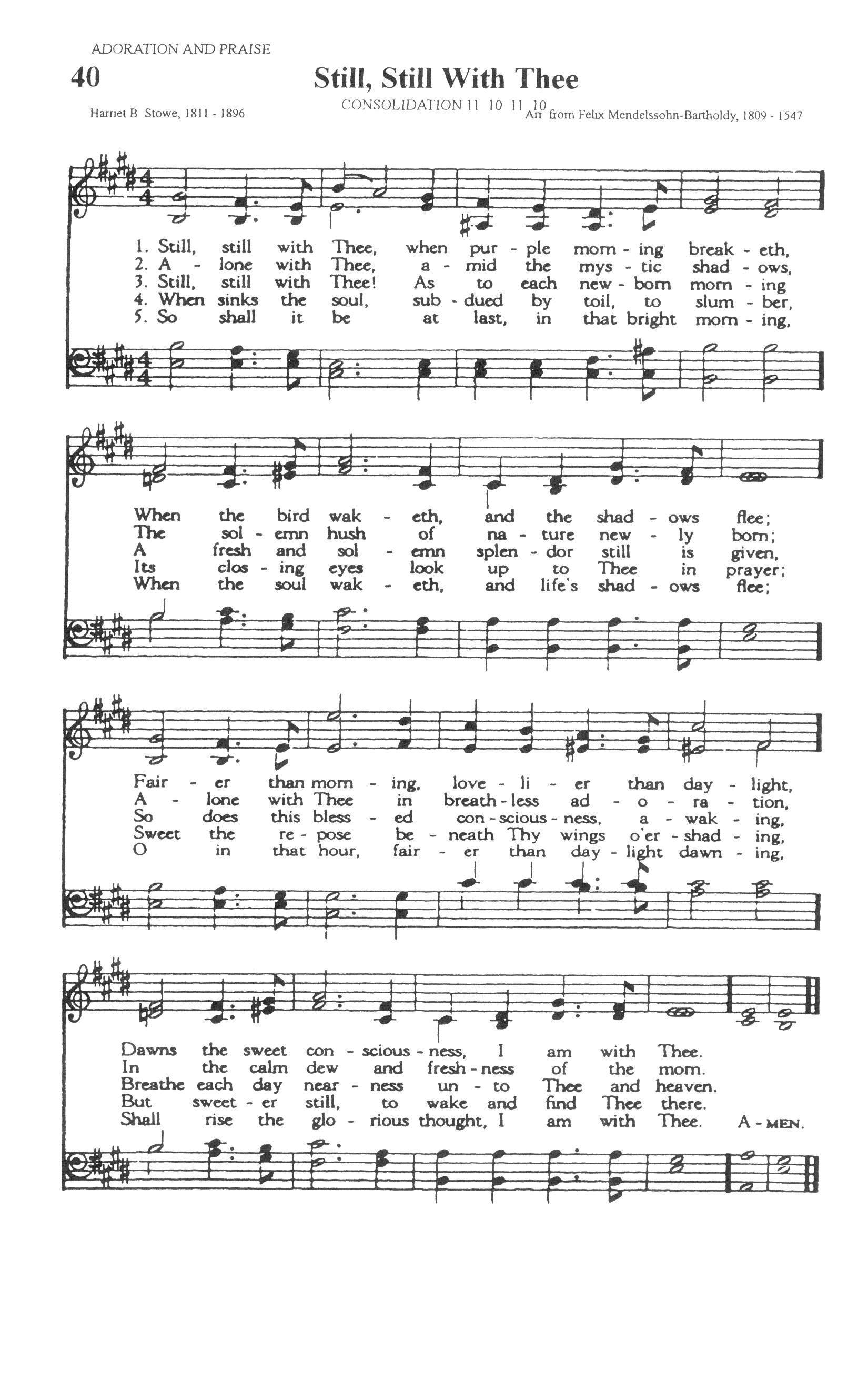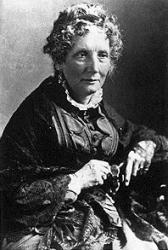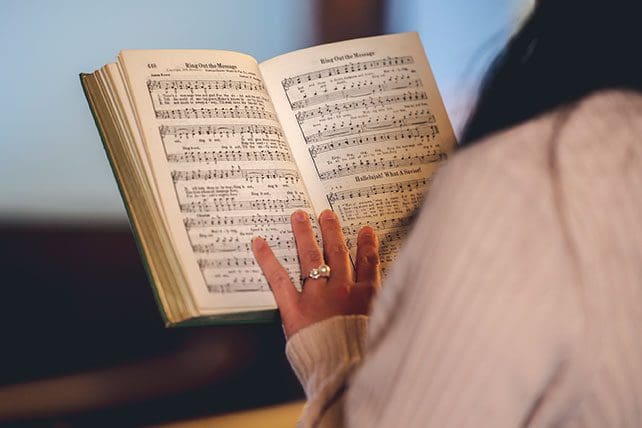Still, Still with Thee
Lyrics
When the bird waketh, and the shadows flee;
Fairer than morning, lovelier than daylight,
Dawns the sweet consciousness I am with Thee.
The solemn hush of nature newly born;
Alone with Thee in breathless adoration,
In the calm dew and freshness of the morn.
A fresh and solemn splendor still is given,
So does this blessed consciousness, awaking,
Breathe each day nearness unto Thee and heaven.
Its closing eyes look up to Thee in prayer;
Sweet the repose beneath Thy wings o'ershading,
But sweeter still, to wake and find Thee there.
When the soul waketh, and life's shadows flee;
O in that hour, fairer than daylight dawning,
Shall rise the glorious thought, I am with Thee.
Bible Reference
Psalm 139:17–18
About This Hymn
Still, Still with Thee is a quiet, meditative hymn that reflects on the presence of God in every moment of the believer’s life, especially in the quiet hours of the morning and the peace that comes with spiritual rest. The text was written by Harriet Beecher Stowe, best known as the author of Uncle Tom’s Cabin, a novel that powerfully influenced the anti-slavery movement in 19th-century America. But beyond her work as a social reformer, Stowe was also a deeply spiritual woman who poured her faith into poetry, essays, and hymns. This particular hymn stands as a beautiful testimony to her inner spiritual life.
The hymn’s title and theme are drawn directly from Psalm 139:18—“When I awake, I am still with thee.” This verse encapsulates the idea of God’s constant presence, even as one transitions from sleep to wakefulness, from night to day. The poem was originally published in Stowe’s 1855 book Religious Poems. Its serene language and reflective tone captured the hearts of many, and it was later set to music, most notably by composer Felix Mendelssohn, using an adapted melody from his work.
The hymn begins with the image of early morning, a time of quiet stillness when the soul naturally turns to God. Stowe speaks of awakening “when purple morning breaketh,” capturing both the beauty of the dawn and the soul’s instinctive yearning to commune with the divine. In these moments, the believer feels God's closeness, not as a sudden intrusion but as a continual presence that has remained through the night.
Stanza by stanza, the hymn progresses from the peace of sleep to the activity of the day. Yet even as one rises to meet the demands of life, God’s presence remains unchanged. This is a central message of the hymn: whether in rest or labor, stillness or motion, solitude or society, God is “still” with the soul that abides in Him. The repetition of the word “still” carries a dual meaning—it conveys both constancy and quietness, a beautiful poetic choice that captures the atmosphere of devotion.
Later stanzas speak of the brightness and distractions of daytime, the demands of duty, and the presence of others, yet Stowe affirms that these things do not diminish the nearness of God. Even when “life’s duties crowd” and “all the world’s gay throng” surrounds us, the soul that has tasted communion with God in stillness can carry that same peace throughout the day.
There is also a note of anticipation in the hymn’s final lines. Stowe looks beyond the present life to eternity, expressing a gentle longing for the day when, beyond death, she will awake “with Thee.” This final verse transforms the theme from daily morning awakening to the believer’s final awakening in glory. Death is not an end but a transition into even deeper communion with God.
The gentle cadence, quiet imagery, and profound spiritual reflection make Still, Still with Thee a beloved hymn among those who value personal devotion and inward spiritual experience. It is particularly appropriate for morning worship, times of reflection, and even funeral or memorial services, where the theme of God’s abiding presence brings great comfort.
Harriet Beecher Stowe’s legacy as a writer is often measured by her impact on social justice, but this hymn reveals another side of her heart—the side devoted to walking closely with God, cherishing His presence in both life’s quietest and most challenging moments. Still, Still with Thee continues to resonate with Christians who seek a deep and abiding relationship with their Savior, sustained in the stillness of morning and carried into the promise of eternal life.


📬 Subscribe to Our Devotional Updates
Receive weekly hymns, devotionals, and website features directly in your inbox.
Hymn Information

- Category: Hymn
- Author/Writer: Harriet Beecher Stowe (1855)
- Added: July 12, 2025
- Last Updated: July 13, 2025
- Views: 1137
To view the author's biography, click their name above.
MIDI File
Popular Hymns
Recent Blog Posts
Popular Blog Posts
Visit Us on Social Media
Latest from X (Twitter)
Tweets by HymnalLibraryLatest from Facebook
Latest on YouTube
Daily Bible Verse
Disclaimer
The hymns, sheet music, MIDI files, and related content on this website are provided for educational and research purposes only.
- Public Domain: Many of the hymns featured here are in the public domain and may be freely used.
- Copyrighted Works: Some hymns may still be under copyright protection. Where applicable, permission has either been requested from the copyright owner, or the content is shared under the principles of fair use for educational purposes.
⚠️ Important Notice: If you wish to reproduce, distribute, or use any copyrighted hymn beyond personal study or educational use, you must obtain permission directly from the copyright holder. This website does not grant any rights for commercial use yet.
If there is any other question please address it to us in our Contact Page, for further assistance. Thank you for using the site. May God Bless You.













